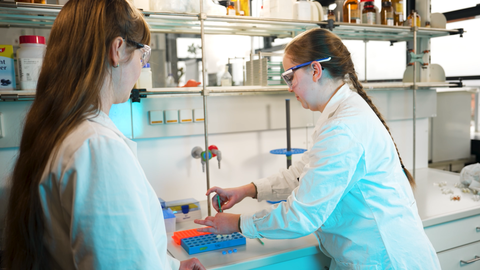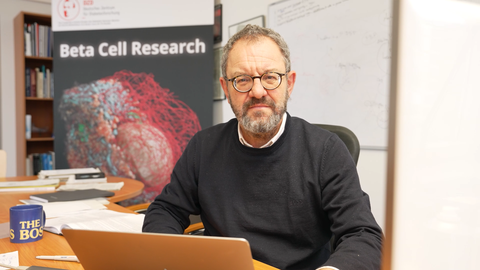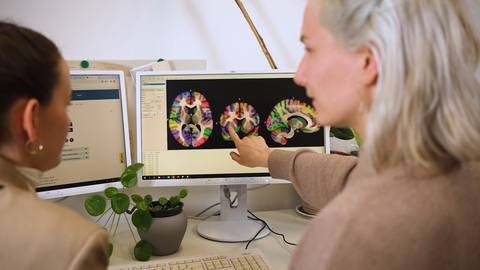Jun 03, 2024
Sugar: Sweet and yet bad for your health? “Gute Frage” (Good question) on diabetes, sugar tax and sweeteners
Obesity, tooth decay, diabetes: We all know the health risks associated with sugar. At the same time, sugar is the most important source of energy for our bodies. How much sugar is too much? Can sugar get us addicted? Could a sugar tax help to reduce consumption? In our new episode of the “Gute Frage” video series, researchers from TU Dresden explore these issues.
Not all sugars are the same. They go by many different names: “First of all, sugar is often used as an umbrella term for the carbohydrate group of substances,” explains food chemist Paula Klügel. These include monosaccharides such as glucose or fructose, disaccharides such as the household sugar sucrose, and polysaccharides, of which starch is particularly well known.
In addition to its sweet taste, sugar fulfills other important technological functions in food. “It serves as a humectant, preservative, provides texture and mouthfeel or supports ripening processes, for example in salami,” explains Stephanie Treibmann, who also conducts research at the Chair of Food Chemistry. However, sugar in all its forms is first and foremost an essential source of energy that our human body depends on, especially our brain.
Nevertheless, obesity, tooth decay, cardiovascular disease and diabetes are possible consequences of excessive sugar consumption. “The American Heart Association recommends that women consume no more than 25 grams and men no more than 37 grams of sugar per day,” says Professor Michele Solimena. If we consume more sugar than we need for energy, it is stored in our body's fat cells. The consequences of sugar overconsumption can be seen worldwide:
“Diabetes is the most widespread non-contagious disease in the world,” explains Michele Solimena, who researches the disease at the Paul Langerhans Institute Dresden. He and his team are investigating beta cells in the pancreas, which produce insulin and are responsible for maintaining the glucose level in the blood. “If these cells become unable to cope with the amounts of glucose, this leads to type 2 diabetes.”
According to the World Health Organization (WHO), people in Germany consume significantly more sugar than recommended, at 89 grams per person per day. A sugar tax could have an impact on sugar consumption. “The incentive function of increased taxes would come into play,” explains Katharina Bettig. This way, the state could regulate and at best minimize undesirable behavior. Reducing costs for the healthcare system could be a motivating factor. “Today, almost half of all people live in regions where there are taxes on sugary drinks,” continues the economist from TU Dresden, “even if the structure of these taxes varies greatly.”
Studies show that price hikes through sugar taxes actually lead to reduced consumption, whereas the actual effects on health could hardly be proven so far. This is due to the fact that consumers switch to other products that are not taxed. Producers, on the other hand, are focusing more on sugar alternatives, which are not healthier per se, as food chemist Paula Klügel adds.
There is an ongoing debate as to whether sugar can be downright addictive. Addictions are characterized by a loss of control, a strong craving for an action, and the neglect of other social behaviors. “When it comes to sugar, however, we only see some of the characteristic symptoms,” explains psychologist Malin Hildebrandt. We can see loss of control with sugary foods, whilst we cannot observe total neglect of other activities.
“If we look at the end of the scientific debate, the consensus is that excessive sugar consumption is not an addiction,” says the addiction researcher from TU Dresden. Nevertheless, we can observe similar reactions in the brain to the consumption of drugs. Sugar also has a strong rewarding effect, even if this wears off more quickly. However, addictive substances or certain addictive behaviors restructure the reward system in the long term, whereas there is no indication of this with sugar.
The experts from TU Dresden talk in more detail about the advantages and disadvantages of sugar alternatives, research in the field of diabetes, and the possible effects of a sugar tax in our latest episode of “Gute Frage” on the “TU Dresden entdecken” (Discover TU Dresden) YouTube channel.
Video (in German): https://youtu.be/JzAZQSYvGbY
Contacts:
Paula Klügel
Chair of Food Chemistry
Prof. Michele Solimena
Contact: Frank Möller
Paul Langerhans Institute Dresden





